
The SHARPP Center at UNH has a lengthy and rich history dating back to the late 1970s. Over the years, our location, program name, and overall structure have changed to best meet the needs of our community. We exist today as a direct result of student activism, community organizing, and faculty/staff member advocacy and vision. Although our roots stem from UNH Durham, today we serve all University of New Hampshire campuses across the state.
At the start of 2024, we began to take a deeper look at our program's name (SHARPP - Sexual Harassment and Rape Prevention Program) to ensure we were remaining accessible to all UNH community members and accurately representing our full scope of services. Our program's name had not been changed since 1982 and after careful consideration, community member feedback, and multiple focus groups made up of undergraduate, graduate, and faculty/staff members, we formally changed our name.
The goals of our name change process were to:
- Update our name to better reflect:
- The full scope of our work, representing both prevention and advocacy
- That we serve people affected by all experiences of interpersonal violence (IPV), not solely sexual harassment and sexual violence
- Maintain a connection to our
- History & roots, which make us unique when compared to other collegiate programs similar to ours across the country
- Acronym "SHARPP", which has significant recognition and longevity here at UNH
- Create a new name that is more inclusive, descriptive, and trauma-informed for individuals who have experienced harm
Our understanding of, and the language we use to describe interpersonal violence issues continues to evolve and shift. Neither UNH nor the climate around IPV look the same as when we became SHARPP in 1982 and it feels like, in 2024, it is time for our name to reflect that. As of August 2024, our program's name changed to The SHARPP Center for Interpersonal Violence Awareness, Prevention, and Advocacy (or The SHARPP Center for short). With this new name, we drop the words behind the acronym SHARPP and instead use it as a moniker that ties us back to our history.
The information detailed on the timeline below was compiled through research conducted by Sriyam Rimal (UNH '24 Alumna) and Erica Vazza (SHARPP staff member and UNH '14 Alumna). This year-long archival project took place during the 2023-2024 academic year with the help of the University of New Hampshire's Special Collections, Archives & Museum along with the Scholar's Repository. This timeline was made into a visual display showcasing The SHARPP Center's decades-long history in the spring of 2024.
*What is outlined on this webpage is not a comprehensive timeline of SHARPP's full history. With a legacy of over 45 years here at UNH, we chose for this webpage to feature a more general overview of key milestones that contributed to the creation of SHARPP and/or that highlight the relevant national & local climates around interpersonal violence.
The early-mid 1970s contained pivotal national, regional, and local milestones that began to set the foundation for interpersonal violence (IPV) support services and awareness-raising initiatives. These included the first NH public hearing on the status of women (coordinated by the NH Commission on the Status of Women in 1971), the signing of Title IX by President Nixon in 1972, the first ever Take Back The Night event held at the University of Southern Florida ( 1972), Congress amending the Federal Rules of Evidence while creating the Privacy Protection for Rape Victims Act (1975), and the creation of the New Hampshire Coalition Against Domestic & Sexual Violence (NHCADSV) in 1977. These milestones (and so many more) laid the groundwork for SHARPP (or rather a version of it) to come into existence by 1978.
1978
Barbara Cavanaugh (Former Associate Director of Nursing Services at UNH's Health Center) chaired a group of concerned faculty, staff, and community members looking to support survivors of sexual violence and prevent assault from happening at UNH. This group formally became "The Rape Task Force" and maintained the goals of recording campus sexual assault data, developing services for survivors, training employees, and educating the public about sexual violence.
Sometime within the early 1980's, The Rape Task Force changed its name to "The Rape Assistance and Information Program" (RAIP).
1981
- Students organized to hold the first Take Back The Night event at UNH
- Liz Day (former Director of the Woman's Resource Center in Portsmouth) collaborated with the Rape Task Force/RAIP to facilitate UNH's first-ever volunteer training program for advocates. Staff members from Health Services (now known as Health & Wellness), UNH Police, Durham Police, Residential Life, and Dispatch were the first 24/7 on-call advocates for survivors/victims of violence.
- The National Coalition Against Domestic Violence formally hosts the Day of Unity, a day focused on connecting advocates from across the country who were working to end domestic violence in their communities. The Day of Unity would eventually expand into a week and then a full month dedicated to awareness and education. Years later it would become "Domestic Violence Awareness Month" (or as it's known here at UNH, "Relationship Abuse Awareness Month").
1982
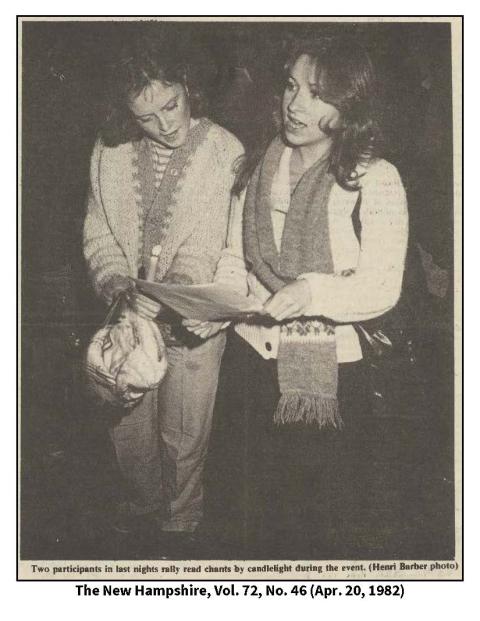
- Nancy Schroeder (former Assistant Dean of Students) assumed leadership of RAIP as part of her job description and applied for programmatic funding from Evelyn Handler, UNH's president at the time. The program received a grant of $7,500 which was its first form of official University funding.
- The Rape Assistance and Information Program formally changed its name to SHARPP: The Sexual Harassment and Rape Prevention Program.
1984
UNH implemented non-sexist language policies and guidelines for community members
1986
Supreme court ruling defines sexual harassment as sexual discrimination based on Title VII guidelines
1987
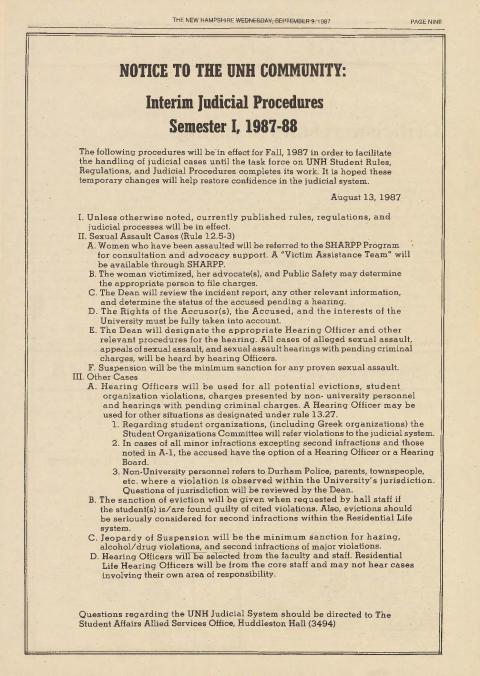
- Widely publicized sexual assault occurs in a UNH residence hall involving three male perpetrators and one female victim. Two of the three perpetrators were arrested and charged with aggravated felonious sexual assault in a criminal court process. Later that year, a public (open for viewing/attendance) hearing was held at UNH in Hamilton Smith Hall. The three male students were found not responsible by UNH. Community members were outraged by the overall hearing process, lack of training of the judicial board, lack of support given to the survivor, and the actions of the lawyer. This resulted in campus-wide protests, walk-outs, rallies, and student outrage.
- UNH President Haaland announced and endorsed a new sexual harassment policy, and by April the Administrative Board approved the policy to be used system-wide
- A University committee was formed to advise the President on issues related to sexual violence
- Emergency phones were installed around campus
- UNH President Haaland announces the start of a full-time sexual assault program
- Mariquita (Maggie) Morrison becomes part-time SHARPP Coordinator
1988
- Mariquita (Maggie) Morrison steps out of her part-time Coordinator position when the role is made full-time. Eve Goodmon, SHARPP's first full-time Coordinator, is hired.
- UNH Faculty members in Justice Studies complete research on unwanted sexual experiences at UNH (this was prior to mandated campus climate surveys and helped assess experiences of violence specific to UNH)
1990
SHARPP supports student activists in launching a student-run escort and safe rides service, after university funding was cut for these programs that had previously been facilitated by staff members. Students secure a Parents' Association grant for $5,000 to run this program.
1992
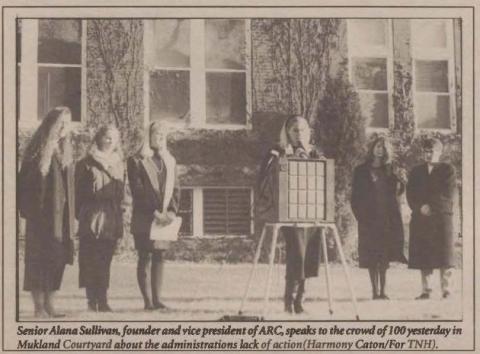
- UNH fraternities' songs/chants are publicly criticized and reviewed due to sexist, graphic, and inappropriate language
- Students organize and form a community coalition called Against Rape Culture (ARC) aimed at addressing harassment and sexual violence happening on campus
1993
- The first Clothesline Project is hosted at UNH by SHARPP
- Marital rape becomes a crime in all 50 states
1994
President Clinton signs the Violence Against Women Act (VAWA)
1995
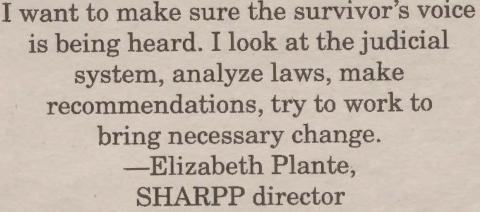
- UNH students organize and attend the National Women's Rights Rally in Washington, D.C.
- Eve Goodmon resigns and Elizabeth Plante is appointed as the new SHARPP Director
1997
- UNH's sexual misconduct policy is amended
- UNH fraternities and sororities collaborate with SHARPP for their annual Take Back The Night event, marking the first instance of this partnership at UNH
1999
SHARPP hosts open forums for the UNH community focused on discussing campus climate, harassment/violence, campus culture, and social norms
In the early 2000s, SHARPP moves locations from the Batchellor House to Wolff House and hosts the inaugural SHARPP Open House event. Throughout these years, SHARPP begins to offer more educational programming and awareness-raising events in addition to support-based spaces. This includes discussions for men on masculinity, open forums, mock trials, guest speakers, peer education programming, and more.
2000
- UNH faculty members in Justice Studies complete additional research on unwanted sexual experiences at UNH, releasing a second community report
- Greek/SHARPP liaison program is established at UNH
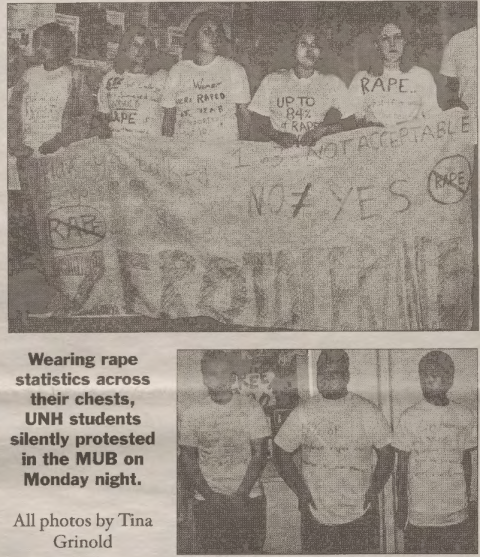
TNH Vol. 91 No. 40 (Mar. 23 2001)
2001
- April officially becomes Sexual Assault Awareness Month nationally. However, college and university offices (including SHARPP) had been hosting educational and awareness events throughout the month of April since the late 1990s.
- UNH students rally at the MUB holding banners and wearing t-shirts with statistics related to interpersonal violence (in response to an increase of sexual assaults)
2004
January officially becomes National Stalking Awareness Month
2006
- Survivor and activist Tarana Burke founds the Me Too Movement
- UNH Faculty members in Justice Studies complete additional research on unwanted sexual experiences at UNH, releasing a third community report
2012
UNH Faculty members in Justice Studies complete additional research on unwanted sexual experiences at UNH, releasing their fourth and final community report
2014
White House Task Force to Protect Students from Sexual Assault is created
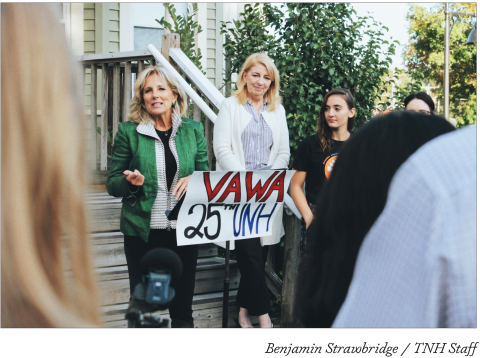
TNH Vol. 109 No. 4 (Sep. 19 2019)
2019
- Jill Biden visits SHARPP to celebrate the 25th anniversary of the Violence Against Women Act
- UNH administered a campus climate survey focused on assessing community members' attitudes, beliefs, and experiences
2021
SHARPP and Health & Wellness staff co-author and publicly release UNH’s Comprehensive Interpersonal Violence Prevention Plan
2024
SHARPP engages community members in focus groups and dialogues in order to create a name that more accurately represents the comprehensive work we do. We formally become The SHARPP Center for Interpersonal Violence Awareness, Prevention, & Advocacy
